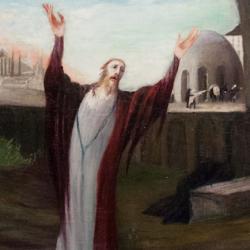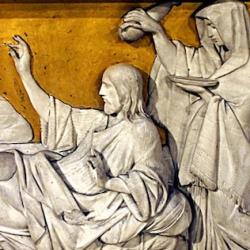Why should the blood of all righteous men and prophets be charged to first-century Jerusalem (Matthew 23:35-36)? Jerusalem didn’t even exist when Cain killed Abel, and “this generation” didn’t kill Zechariah. Isn’t it unfair for them to suffer judgment for the sins of their fathers? Doesn’t Ezekiel tell us that God doesn’t work like that?
But it’s hard to see how it could work differently, so long as God works in time. We might construct a similar objection on an individual level: The “I” that committed murder last year is a very different person from my now-reformed “I”; why should this later I be punished for the crimes of an earlier instantiation of me? That is, the alternative seems to be for God to judge every sin at the moment it’s done.
Ok, that’s an extreme alternative. There are more modest ones.
God might judge every generation on its own terms (assuming we can identify a generation and neatly bracket it off from others). That may seem more just, but in practice it appears to lack compassion. A generation falls into sin, and God whacks it good as soon as it happens. Sin is cut off in its infancy; that seems an advantage. But it’s at the price of making God appear harsh, quick-to-anger. But He’s not. He’s slow to anger, and how can that slowness be manifest unless He waits for sin to mature or for sinner to repent before He acts.
The pattern of Matthew 23 is the pattern we always see. Yahweh didn’t destroy the world as soon as Adam ate the fruit, nor when Cain killed Abel, nor when Lamech started to avenge himself seventy-seven fold, nor when the first son of God married the first daughter of Eve. It was not until the generation of Noah that He wiped things clean, and the generation of Noah could make the same complaint against God’s justice that first-century Jews could make: Why are we being punished for the sins of our fathers?
Israel’s history is the same. Idolatry flourishes with little interruption for a couple of centuries before Yahweh gets rid of Israel, and then Judah. The last kings were no worse than earlier ones – why should they suffer the punishment?
The image of the filling cup gives us a handle on the process. God destroys the Amorites when their cup is full, and Jerusalem when it has filled up the sins of its fathers. The last generation may have only added a centimeter or two to the top of the cup. But they have to drink the whole thing, because they were the ones alive when the cup got up to the brim.











